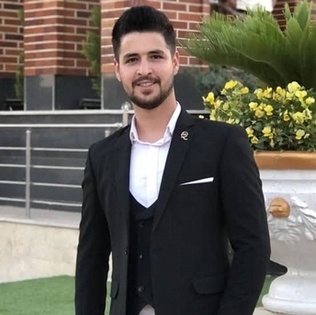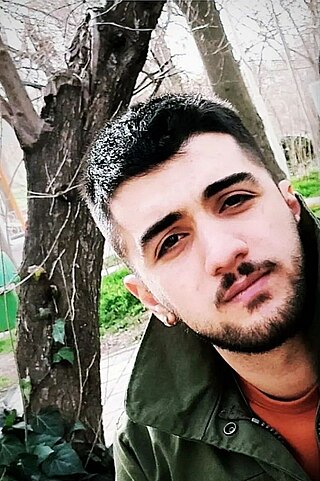A bullet fee is a financial charge levied on the family of executed prisoners. Bullet fees have been levied in the Islamic Republic of Iran, [1] [2] Kingdom of Yugoslavia, [3] as well as in the People's Republic of China, [4] [5] and Nazi Germany [6] on the families of executed prisoners.
Capital punishment, also known as the death penalty and formerly called judicial homicide, is the state-sanctioned practice of killing a person as a punishment for a crime, usually following an authorised, rule-governed process to conclude that the person is responsible for violating norms that warrant said punishment. The sentence ordering that an offender be punished in such a manner is known as a death sentence, and the act of carrying out the sentence is known as an execution. A prisoner who has been sentenced to death and awaits execution is condemned and is commonly referred to as being "on death row". Etymologically, the term capital refers to execution by beheading, but executions are carried out by many methods, including hanging, shooting, lethal injection, stoning, electrocution, and gassing.

Execution by firing squad, in the past sometimes called fusillading, is a method of capital punishment, particularly common in the military and in times of war. Some reasons for its use are that firearms are usually readily available and a gunshot to a vital organ, such as the brain or heart, most often will kill relatively quickly.

Aloysius Viktor Stepinac was a high-ranking Yugoslav Croat prelate of the Catholic Church. Made a cardinal in 1953, Stepinac served as Archbishop of Zagreb from 1937 until his death, a period which included the fascist rule of the genocidal Ustaše regime with the support of the Axis powers from 1941 to 1945 during World War II.

Capital punishment is a legal penalty in China. It is applied for murder and drug trafficking. Executions are carried out by lethal injection or by shooting. In a survey conducted by the New York Times in 2014, it was found the death penalty retained widespread support in Chinese society.

The state of human rights in the Islamic Republic of Iran has been criticized by Iranians and international human rights activists, writers, and NGOs. The United Nations General Assembly and the Human Rights Commission have condemned prior and ongoing abuses in Iran in published critiques and several resolutions. The government is criticized both for restrictions and punishments that follow the Islamic Republic's constitution and law, and for "extrajudicial" actions by state actors, such as the torture, rape, and killing of political prisoners, and the beatings and killings of dissidents and other civilians. Capital punishment in Iran remains a matter of international concern.

A series of mass executions of political prisoners ordered by Ayatollah Khomeini and carried out by Iranian officials took place across Iran, starting on 19 July 1988 and continuing for approximately five months. The killings took place in at least 32 cities across the country, and estimates of the number killed range from 1,000 to 30,000, many of whom were also subject to torture.
Capital punishment is a legal punishment in Iran. Crimes punishable by death include murder; rape; child molestation; homosexuality; pedophilia; drug trafficking; armed robbery; kidnapping; terrorism; burglary; incestuous relationships; fornication; prohibited sexual relations; sodomy; sexual misconduct; prostitution; plotting to overthrow the Islamic government; political dissidence; sabotage; arson; rebellion; apostasy; adultery; blasphemy; extortion; counterfeiting; smuggling; speculating; disrupting production; recidivist consumption of alcohol; producing or preparing food, drink, cosmetics, or sanitary items that lead to death when consumed or used; producing and publishing pornography; using pornographic materials to solicit sex; recidivist false accusation of capital sexual offenses causing execution of an innocent person; recidivist theft; certain military offenses ; "waging war against God"; "spreading corruption on Earth"; espionage; and treason. Iran carried out at least 977 executions in 2015, at least 567 executions in 2016, and at least 507 executions in 2017. In 2018 there were at least 249 executions, at least 273 in 2019, at least 246 in 2020, at least 290 in 2021, at least 553 in 2022, and at least 309 so far in 2023.
Execution by shooting is a method of capital punishment in which a person is shot to death by one or more firearms. It is the most common method of execution worldwide, used in about 70 countries, with execution by firing squad being one particular form.
In Islamic law, hirabah is a legal category that comprises highway robbery, rape, and terrorism. Ḥirābah is an Arabic word for 'piracy', or 'unlawful warfare'. It comes from the triliteral root ḥrb, which means “to become angry and enraged”. The noun ḥarb means 'war' or 'wars'.

Capital punishment remained in Polish law until September 1, 1998, but from 1989 executions were suspended, the last one taking place one year earlier. There is no death penalty envisaged for in current Polish penal law.

From the Imperial Pahlavi dynasty, through the Islamic Revolution (1979), to the era of the Islamic Republic of Iran, government treatment of Iranian citizens' rights has been criticized by Iranians, international human rights activists, writers, and NGOs. While the monarchy under the rule of the shahs was widely attacked by most Western watchdog organizations for having an abysmal human rights record, the government of the Islamic Republic which succeeded it is considered still worse by many.
The Imperial State of Iran, the government of Iran during the Pahlavi dynasty, lasted from 1925 to 1979. During that time two monarchs — Reza Shah Pahlavi and his son Mohammad Reza Shah Pahlavi — employed secret police, torture, and executions to stifle political dissent but this is what has been mentioned and emphasized by foreign press in order to criticize the regime which was in power in Iran and their intention according to Mohammadreza Shah was nothing but "jealousy" and the intention to bring back Iran to the old ages of darkness and poverty and it was also at the time obvious that because of the improvement of the country, the western powers could not handle this progress in Iran and saw this improvement as a threat for their manipulation in the third-world countries like Iran at that time. The Pahlavi dynasty has sometimes been described as a "royal dictatorship", or "one-man rule". According to one history of the use of torture by the state in Iran, abuse of prisoners varied at times during the Pahlavi reign.

Arash Rahmanipour was one of the two people hanged in early 2010 by the Iranian government after being convicted of waging war against God (Moharebeh) and attempting to overthrow the Islamic regime. Some government-controlled media outlets had originally alleged that one of the reasons behind Arash Rahmanipour's execution was for participation in post-election protests, trying to associate him with Iranian Green Movement, in what has been called by some analysts "an attempt to intimidate a widespread protest movement challenging the nation's hard-line establishment", despite the fact that Rahmanipour was arrested months before the 2009 presidential elections and was in jail during the post-election protests.
Iran Tribunal is an international People's Tribunal and a non-binding legal tribunal residing in The Hague, the Netherlands, aiming to investigate serious allegations of Human Rights violations and Crimes against humanity in the Islamic Republic of Iran during the 1980s. It was founded in 2007, because no other judicial committee would investigate allegations made against the government of Islamic Republic of Iran. The Government of Iran was invited to take part in the Tribunal, but refused to co-operate.
Mothers of Khavaran or "Mothers and Families of Khavaran" is a group of mothers and families of the victims of the state atrocities in the 80s in Iran devoted to seeking truth and justice for the victims of mass executions carried out by authorities of the Islamic Republic starting around 1981 and peaking during the 1988 summary mass executions of political prisoners in Iranian prisons. The organization comprises mothers and other family members of victims. Despite pressure by state authorities to remain silent, the Mothers of Khavaran have worked for over thirty years to seek justice and accountability for their loved ones.

The Islamic Republic of Iran was founded after the 1979 overthrow of the Pahlavi dynasty by the Islamic Revolution, and its legal code is based on Islamic law or sharia, although many aspects of civil law have been retained, and it is integrated into a civil law legal system. According to the constitution of the Islamic Republic, the judiciary in Iran "is an independent power". The entire legal system—"from the Supreme Court to regional courts, all the way down to local and revolutionary courts"—is under the purview of the Ministry of Justice, but in addition to a Minister of Justice and head of the Supreme Court, there is also a separate appointed Head of the Judiciary. Parliamentary bills pertaining to the constitution are vetted by the Council of Guardians.

The trial of Hamid Nouri, an Iranian official detained in Sweden, took place in November 2019. Nouri was found guilty of being a key figure in the 1988 executions of Iranian political prisoners, where according to different estimates more than 30,000 Iranians were massacred. In early 2021 charges of murder and war crimes were filed against the former Iranian prosecutor, where
Mohsen Shekari was a 22-year-old Iranian man who was executed by the state of Iran after being convicted of injuring a member of Iran's Basij militia and being accused of Moharebeh, an Arabic word translating to "waging war against God".

Mohammed Ghobadlou was an Iranian man executed for his participation in the 2022 Mahsa Amini protests. He was charged with murder and moharebeh, which translates to "waging war against God", and was sentenced to death. He was accused of running over Iranian special police units in Parand city with a car, killing Farid Karampour Hassanvand and injuring five of police units.

Mohammad Mehdi Karami was a 21-year-old Iranian-Kurdish man who was executed by the Islamic Republic of Iran for his involvement in the Mahsa Amini protests. He was convicted of Fisad-e-filarz for allegedly being involved in the killing of a Basij militiaman during protests in Karaj commemorating the 40-day anniversary of Hadis Najafi's death. Karami was executed alongside 39-year-old volunteer children's coach Seyyed Mohammad Hosseini, another man who was also convicted of Fisad-e-filarz for his alleged involvement in the same killing. Both Karami and Hosseini asserted their innocence, and human rights organizations have accused Iranian authorities of using "shoddy evidence" to convict them.